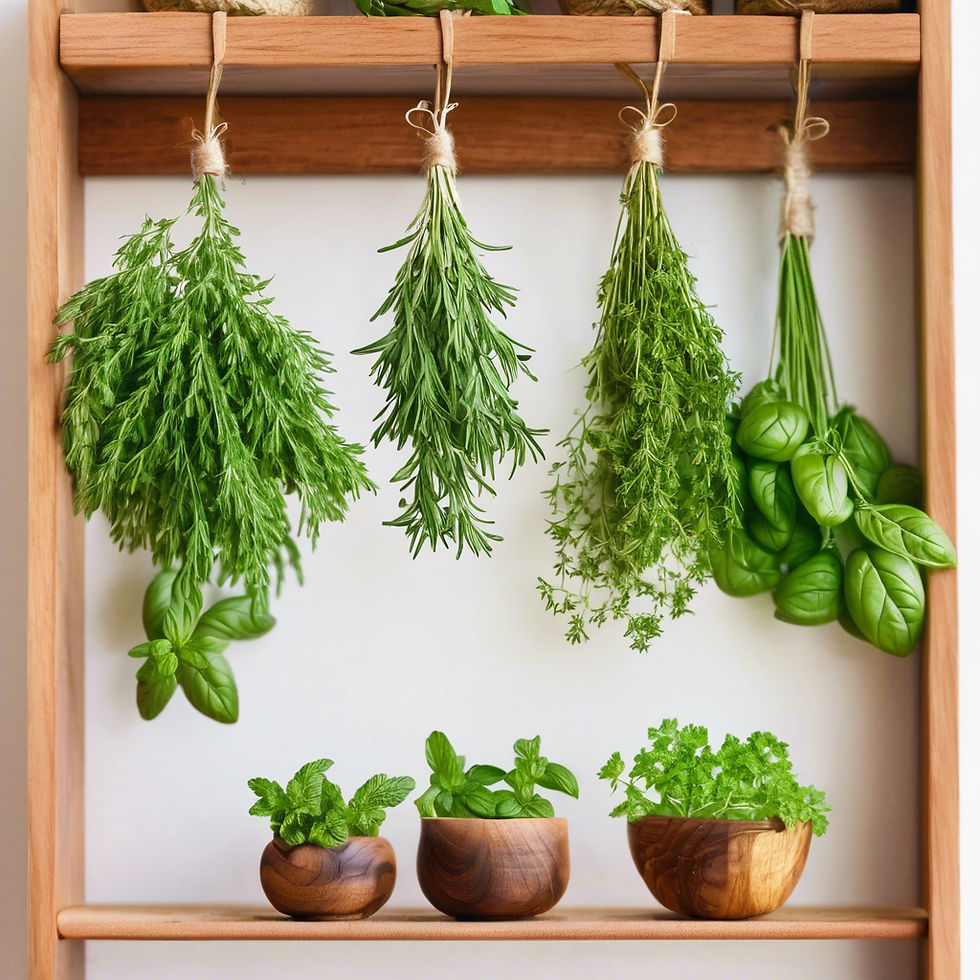Cook with These 12 Herbs and Spices Instead of Salt
- Jeannine Love

- Jun 9, 2025
- 3 min read

Have you been diagnosed with high blood pressure, another heart disease, pre-diabetes, or diabetes? If so, your doctor may have told you to cut down or eliminate salt from your diet. Salt adds flavor to foods, but so do other spices and herbs. Try any of these 12 herbs and spices instead of salt when you cook. In addition to making your food taste great, these herbs have health benefits.
12 Herbs and Spices for Cooking
Basil (Ocimum basilicum)
Basil is an anti-inflammatory, and can help you to reduce your triglycerides and cholesterol levels. It’s high in antioxidants, so it fights free radicals that damage the body. Basil also helps to slowly release sugar into the blood, therefore it benefits people with blood sugar issues.
Cilantro (Coriandrum sativum)
Cilantro helps rid the body of heavy metals, aids digestion by preventing gas and bloating. It's a cooling digestive so can help you to relieve indigestion and heartburn. Other benefits include reducing anxiety and aiding sleep, lowering blood sugar levels, and aiding the circulatory system by lowering blood pressure and cholesterol.
Dill (Anethum graveolens)
Dill is rich in antioxidants and is a good source of vitamins A and C and magnesium; and it also helps to ease digestive issues, such as gas and bloating. As an antispasmodic, it's good for colic or intestinal cramping.
Fennel (Foeniculum vulgare)
Fennel aids digestion by strengthening it and can relieve gas and bloating. Its antispasmodic property makes it useful for intestinal cramping. Fennel also helps ease coughs and is a decongestant and an expectorant. As a diuretic it can help the body eliminate excess fluid.
Garlic (Allium sativum)
Garlic is a hot, pungent cardiac stimulant, vasodilator, and helps reduce blood pressure. It’s also a blood thinner. If you can’t eat raw garlic, try a Garlic-infused Olive Oil. I use my garlic oil for all stir-fries, roasting, and on salads.
Mint (Mentha)
Mint is refreshing and stimulating, aids digestion, is a vasodilator, and it calms the immune system.
Oregano (Origanum vulgare)
Oregano was used in Ancient Greece and Rome for medicinal purposes. It aids digestion and goes well with basil for Italian dishes.
Parsley (Petroselinum crispum)
Parsley aids digestion, is high in antioxidants, is a blood cleanser, and burns toxins. It’s also hypolipidemic.
Pepper (Piper nigrum and Capsicum annuum)
Whether it’s freshly ground black pepper or the crushed red pepper flakes, pepper aids digestion, burns toxins, and is a cardiac stimulant.
Rosemary (Salvia rosmarinus)
Rosemary stimulates the circulatory system and the nervous system. It will wake you up! Rosemary also has a toning and calming effect on digestion. Make an infused-oil with rosemary, sage, thyme, and garlic in olive oil to use on salads.
Sage (Salvia officinalis)
Sage is loaded with antioxidants and has been traditionally used by women to help ease menopausal symptoms such as hot flashes. Sage may also assist in reducing blood sugar levels, as well as supporting memory and brain health, and lowering “bad” LDL cholesterol. Avoid during pregnancy because it stimulates the muscles of the uterus.
Thyme (Thymus vulgaris)
Thyme is often used as a natural food preservative because it protects it from food-borne bacteria that causes illness. It’s also used for digestive issues, such as stomach upset, colic, diarrhea, and flatulence.
Many of these 12 herbs can be grown in your garden. When you have an abundance of a particular herb, or when it’s the end of the growing season, be sure to dry the herbs and store them in your cupboard.

Cook with lots of herbs to really gain their health benefits; you can even serve chopped herbs in small dishes, so your family can add more herbs to their food. Happy cooking!




Comments